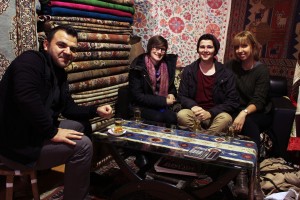While thinking about the topic of gender equality in each of the countries we visited, I found myself moving from the topic of ‘women in power’ (how many are in positions of leadership, are they respected, in what ways do they deal with power, etc.) to the more general topic, and I think more important topic, of gender relations and different societies’ appropriation of the male-psyche as the main way of thought.  As such I believe that we, as men and women, have adopted a male-psyche which seems impossible to shake. Throughout the countries we visited, I noticed that it is not that our laws or society are inherently unfair or provide women with overt obstacles, but now, more than ever, gender inequalities, norms, and barriers are all in our minds. They are created and recreated through the way we think about things and the way we interact with each other. I found it particularly interesting to observe in the countries we visited, and although I could have written for days on this topic and explored Spain & Morocco more, this focuses mainly on Malaysia and Turkey.
As such I believe that we, as men and women, have adopted a male-psyche which seems impossible to shake. Throughout the countries we visited, I noticed that it is not that our laws or society are inherently unfair or provide women with overt obstacles, but now, more than ever, gender inequalities, norms, and barriers are all in our minds. They are created and recreated through the way we think about things and the way we interact with each other. I found it particularly interesting to observe in the countries we visited, and although I could have written for days on this topic and explored Spain & Morocco more, this focuses mainly on Malaysia and Turkey.
Turkey’s rank on the Gender Gap Report for 2013 (http://www.weforum.org/reports/global-gender-gap-report-2013) is pretty poor and as a short-term observer of the society, I would agree that there are still miles to go.The whole time we were in Istanbul, we barely saw any women. Although I was warned this would not be truly representative of any gender inequalities, it is a bit, isn’t it? There were less women on the streets. There is some clear imbalance right there, even if only in the areas we were able to explore. At the very least, it represents that women were less engaged and involved in everyday, street-scene life, from the point of a casual observer (and I think sometimes the casual observer can make some pretty astute observations).

Tea and carpets with Ekrem.
In Turkey I was able to get a lot of insights on women from various sources, including from a local carpet seller, Ekrem, the Chair of Foreign Relations, and a friend who has worked for Zaman Media as a female journalist, Ceren Kumova. Firstly, Ekrem explained to me the beautiful concept of carpet-making in Turkey. Traditionally, kilims or carpets were a way for women and girls to express their dreams, desires and aspirations as they weren’t able to/weren’t encouraged to have career ambitions or work in positions of power. Beautiful and poetic, this practice is now changing, not just because women have greater powers over their futures, but also as cheaper, modern, Chinese-made carpets are overrunning the market for Turkish carpets, which can take years to complete. On the one hand, I am glad that the women aren’t restricted to making carpets as their way of expressing themselves, but on the other hand, it is such a beautiful dying art!
On visiting the Justice and Development party the Chair of Foreign Relations, Erol Adayilmaz, stated that “culture is the biggest obstacle” in securing gender equality for women in Turkey (something I would agree is the biggest problem in our Australian society too). Attempts to overcome this culture (“male-psyche”) are similar to many other countries, like China for example, and relies on the notion of positive discrimination (give girls more rights, benefits etc. over boys). One example Erol quoted was that because tradition dictated that girls should not be educated, financial support is now being offered to get girls into school. The money from this financial support is given to the mother, as “an uneducated mother knows the feeling of being uneducated”. I loved that quote and thought it to be very powerful. It also suggests to me that women are regarded as the ‘responsible’ ones in the family when it comes to money and decision-making. I like this notion as it suggests that even if the outward power still resides with men, the internal, familial power often resides with the women. A sort of balancing scale.
My Turkish friend Ceren who used to work for Zaman Media Group had some interesting observations too:
It is getting easier for women to find a job and I would say opportunities are pretty equal for jobs that require high education. The only thing a woman cannot be is an imam, women can’t lead crowds in prayer. Technically anything else she can be. But on a perception level it is a different story. It is changing rapidly, Turkey has leaped forward in the last decade, but we still don’t believe in women’s capacity to perform as well as men. A simple example is, hairdressers are always men in Turkey. Women are never trusted with their skills. Same goes for doctors, judges, anything that needs critical skills. And by tradition, women do not work outside that much, a woman bus driver is extremely rare. 
As for me, I never had any problems because I am a woman. But I do not feel I am treated equally. As a journalist, when I have to approach wealthy businessmen or politicians or the army, I get the “hello little missy” treatment. Or worse, there is a sexual tone in their approach. We are made to feel less significant than our male counterparts and less capable in our jobs. So no wonder successful women tend to morph into “evil bitches” – there is so much crap they have to wade through. It is getting better, every year it is different, you know. (thanks so much Ceren!)

At the pink mosque, the lovely guide who informed us how unnatural it was that we should sit next to men!
When we were in Malaysia, women were far more obvious and engaged in everyday street life, however inequalities were still very clear and present. When we visited Putrajaya and the mosques there, the guide stated that women are separated in prayer because of course it is natural that men and women wouldn’t pray together, it is natural that women and men wouldn’t sit together. All us students, sitting on the ground and of mixed sex, looked at each other as if to say “…yes…. Of course it is unnatural…”. Within Malaysia, I believe that gender inequality is not such a spoken about issue, as gender norms are deeply ingrained in the society. One student commented that from a young age, girls are taught to put men before themselves, and therefore the status quo, she believes, is not questioned. A glass ceiling does exist, and much like other countries we visited, their rank in the World Economic Forum Gender Gap Report was pretty poor, at 102nd out of 136 countries.

With Prof. Abdelaziz Berghout, Prof. Zaleha Kamaruddin and the Assoc. Prof. Halim Rane at IIUM.
Interestingly, both International Islamic University Malaysia (IIUM) and the International Institute of Islamic Thought and Civilisation (ISTAC) had women leaders. Both professed that like elsewhere in the world, there were more women enrolled than men, yet they were not clear on how or in what ways this translates to jobs outside of the university. The rector of IIUM, Prof. Zaleha Kamaruddin, stated that women’s power was more like water – gentle but it leaves a path, makes its mark. At first I thought, that’s really quite good, what a nice way of describing the power of women. In discussion with my friend Jack though, he said that it made him angry that women should have to be water, that they should have to be gentle and make their mark slowly and change things slowly. On the one side I know why we have to be gentle and slow in making our change due to our societal circumstances, however on the other hand, I agree with Jack – I am angry that this is the assumed position.
Recently when I attended a TEDx event in South Bank in Brisbane, one speaker said something that has stuck with me since. She asked “why exactly should men and women lead in equal numbers? Because the earth needs it, not because it is fair”. What does fairness have to do with anything? It’s like “tolerance”. I hate that word. I hate it when people say “I’m tolerant of other religions/gay people/etc.”. Tolerance says ‘I’ll put up with you, but I don’t understand you, nor care enough to try to’. It’s like when the former PM of Malaysia said “we are able to tolerate people who are not Muslims”. Considering that almost 40% of your population is non-Muslim, I should damn well hope you can do more than tolerate them. Yes they/we are different and that needs to be recognised, but I think if all we are aiming for is tolerance, then we will always fall short. If fairness is all we are aiming for, we are missing the point entirely.
You don’t have to care about any of this and that is precisely why you should. The gender issues I witnessed in my travels were just casual observations, and only part of the picture, but I feel that it is important that we take another look at ourselves as a society and as different societies of this world. We had jokes on this trip like, “oh, I wonder what Elise is going to ask about in this meeting… gender equality??”. But I ask because I care and I observe because I am interested. I feel embarrassed talking and telling people I am interested in gender studies (because I’m a woman?). Why is that? And why do I care what they think anyway…? Yeah, I am a victim of the male-psyche too. 
Keep tuned – 2 more blogs are on their way! ![]() These blog pieces are part of my assessment for the course.
These blog pieces are part of my assessment for the course.



